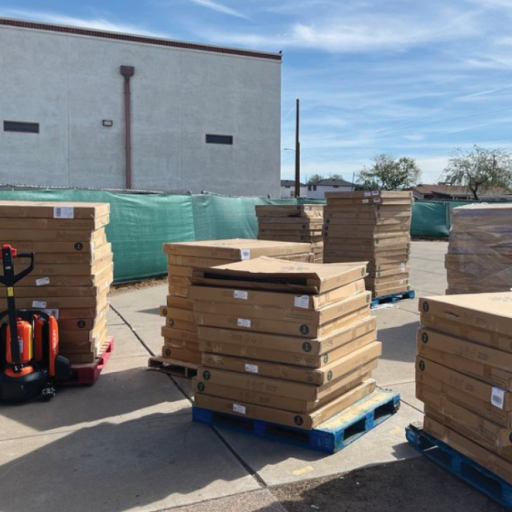Members Give Back: NOBLELIFT and ALAN Partner to Empower Disaster Relief
NOBLELIFT and American Logistics Aid Network (ALAN) continue to partner together when it comes to donating to and assisting in disaster relief. One organization can be strong enough on its own to make a difference in the community. However, when two companies come together and utilize each of their strengths and resources to work toward something bigger, it is awe inspiring.
Loren Swakow, managing director at NOBLELIFT, and Emilee Martichenko, communications coordinator at ALAN give us more insight into these continual giveback efforts.
TMJ: What was the motivation for NOBLELIFT behind donating pallet racks?
Swakow: During my time at the dealership, I became acquainted with ALAN and recognized the significance of their cause. As members of MHEDA, we received notice regarding needs within the community, which often stirred a desire to contribute. However, limitations prevented us from making donations. Now, working at an OEM, we occasionally receive equipment that, while functional, may have minor imperfections that hinder its sale as new. When this happens, the cost of refurbishing these items often outweighs the benefits. So, when ALAN reaches out, we frequently have a couple of pallet trucks that align with their needs.
TMJ: How did this become a joint effort with ALAN?
Swakow: Recently, we made the strategic decision to discontinue a particular product line. Given our substantial inventory, my mind immediately turned to ALAN as a potential avenue for redistribution. Their infrastructure and expertise streamline the process of repurposing surplus inventory. They just facilitated the pickup of a full truckload of semi-electric pallet trucks, still in their original crates, easing our transition while benefiting those in need.
TMJ: What are other “give back” efforts the company and employees participate in?
Swakow: Currently, our company doesn’t have structured philanthropic initiatives beyond supporting employees’ children’s sports teams, where we gladly contribute to fundraising efforts. While these grassroots endeavors hold personal significance for our team, we’re open to exploring additional avenues for community involvement in the future.
TMJ: Is giving back something that’s highlighted already in NOBLELIFT’s culture, or is it something that is a goal to highlight more in the future?
Swakow: Our approach to philanthropy is understated; we don’t actively promote our contributions. Instead, we seize opportunities to assist when circumstances align with our capabilities and resources. This organic approach ensures that our focus remains on the impact of our actions rather than seeking recognition.
 TMJ: Why is it important to give back to the community?
TMJ: Why is it important to give back to the community?
Swakow: Our guiding principle is to “pay it forward.” We recognize that life’s circumstances can change unexpectedly, and the support we extend today may profoundly impact someone facing adversity tomorrow. It’s a philosophy rooted in empathy and solidarity, motivating us to contribute whenever possible.
TMJ: Is there anything else you would like to add?
Swakow: While we appreciate the recognition bestowed upon us by organizations like MHEDA and ALAN, our motivation for giving extends beyond acknowledgment. For us, the decision to donate stems from a simple premise: if we have the means to help, then it’s our responsibility to do so. It’s about embodying the values of compassion and generosity in our actions, regardless of external validation.
To dive into ALAN’s part in this give-back effort, The MHEDA Journal heard from Emilee Martichenko, communications coordinator at ALAN.
TMJ: What was the motivation for ALAN behind donating pallet jacks?
Martichenko: ALAN helps many non-profit organizations that respond to disasters by connecting them with the donated logistics services and supplies they need to maximize their response and recovery operations, allowing them to deliver help faster and make each donated dollar go further. Pallet jacks play a particularly crucial role in disaster response by acting as force multipliers, enabling volunteers and responders to more efficiently distribute a greater amount of humanitarian aid to a greater number of survivors – all at a time when they need it most. It’s a visible display of how employing a little logistics to help with disaster relief efforts can do a lot of good.
NOBLELIFT’s donated pallet jacks are the largest material handling equipment donation we’ve received to date and will undoubtedly be game changers in disaster relief organizations’ abilities to sort and distribute humanitarian aid. Ultimately it will allow these organizations to operate at a level of speed and efficiency that they previously could only hope to attain.
TMJ: How did this become a joint effort with NOBLELIFT?
Martichenko: MHEDA introduced ALAN and NOBLELIFT in the fall of 2022 when Hurricane Ian struck Southwest Florida and we had a large material handling equipment need. NOBLELIFT donated much needed pallet jacks to a food bank responding to the hurricane’s devastation. Since then, ALAN and NOBLELIFT have worked together on a number of ALAN cases, with NOBLELIFT consistently stepping up whenever ALAN has voiced a need for pallet jacks, forklifts and similar materials. The partnership reflects the logistics industry’s belief in the viability of ALAN’s work – and we are sincerely grateful for both NOBLELIFT’s and MHEDA’s continued championing of our mission.
TMJ: What are some other “give-back” efforts the company and employees participate in?
Martichenko: ALAN is a 501(c)(3) nonprofit organization that was formed as a result of the supply chain industry’s response to the logistical failures of Hurricane Katrina. We use the power of coordinated, donated logistics solutions to ensure that humanitarian aid reaches disaster survivors at the right place and at the right time, reducing both material and temporal waste in the process. ALAN does this by supporting disaster relief non-profits with the contributed logistics services and supplies they need to multiply the scope and efficiency of their operations, most notably transportation, warehousing space, material handling equipment, shipping and packaging materials and expertise. We ultimately fill dozens of requests for these kinds of services and equipment each year. If you’d like some additional detail, please visit the Completed Cases and Stories sections of our website at alanaid.org.
In many ways, you can think of who we are and what we do as the industry’s ultimate “give back” to the humanitarian landscape. 19 years later, the in-kind and financial generosity of ALAN’s supply chain network is what enables us to reach hundreds of thousands of disaster survivors each year with water, food, medicine, hygiene supplies and countless other life-saving aid.
 TMJ: Why is it important to give back to the community?
TMJ: Why is it important to give back to the community?
Martichenko: ALAN is motivated each day to deliver help and hope to those who need it most. We strongly believe that communities and the organizations that constitute their social and economic infrastructure are the experts in determining what they most need to ensure a swift recovery from disaster. Understanding that communities are their own best advocates, ALAN places the utmost importance on using logistics to meet the needs that communities and their local non-profits dictate. We take pride in the human-centered approach to our work, its emphasis on needs-based rebuilding and our ability to use logistics as a powerful force for good for relief efforts that all too often go unspotlighted.
TMJ: Is there anything else you would like to add?
Martichenko: ALAN’s donated logistics solutions are just one of several critical pillars of our work. Equally important to our relief efforts are our disaster education and convening programs, which help improve disaster preparedness and supply chain resiliency across the non-profit, private and governmental sectors. Supporting the growth of these programs is an investment in a more disaster-ready future for all of us – and ultimately paves the road for a more swift response and recovery.
To learn more or assist in future disaster relief efforts, visit alanaid.org/how-to-help.




